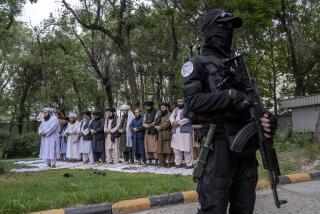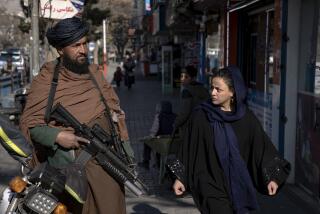Child’s killing in Helmand province adds to U.S.-Afghan frictions
Afghan President Hamid Karzai on Friday condemned the killing of a 4-year-old boy this week during a security patrol by international forces, adding to the animosity between Kabul and Washington that may leave the war-ravaged country on its own at the end of this year to deal with a resurgent Taliban.
Karzai learned of the boy’s death from visiting Helmand Gov. Naeem Baloch, presidential spokesman Aimal Faizi told journalists in Kabul.
The boy apparently was hit when shots were fired during an International Security Assistance Force patrol through farmland in Helmand province, an ISAF spokesman said.
“We condemn the killing of this boy in the strongest terms,” Faizi said on behalf of Karzai, who was once closely aligned with U.S. officials but has become unpredictable and at times hostile toward his supposed wartime allies.
“We have been calling for the complete end of military operations in residential areas,” Faizi said. “This demand has not been taken seriously by foreign troops and the result is civilian casualties, including women and children.”
[Updated 2:15 p.m. Jan. 11: Col. David Lapan of the ISAF media office said Saturday that the incident involving the boy occurred Tuesday during a routine patrol. An ISAF unit perceived a threat as it passed by a compound, he said.
“The unit fired in response to the perceived threat. Unit medical personnel immediately began providing assistance to the wounded boy, however their efforts were unsuccessful, and the child died,” Lapan said in a statement. “ISAF deeply regrets this civilian casualty. The incident is under investigation to determine the facts.”]
Karzai this week announced through Faizi that he would be releasing 72 prisoners captured by U.S. and other foreign forces during the 12-year military operation to rout Taliban and Al Qaeda-aligned militants. The U.S. government had asked authorities in Kabul to keep the suspects in custody, deeming them too dangerous to release even though Karzai says insufficient evidence exists on which to prosecute them for war crimes.
At the heart of the Kabul-Washington tensions is Karzai’s refusal to sign a bilateral security agreement that would allow the Pentagon to keep thousands of troops in Afghanistan after the current combat mission ends in December. Without that U.S.-led force to train Afghan police and soldiers, the country is at risk of being subsumed again by a Taliban reign of terror that shackles women with medieval mores and opposes the education of girls.
Pentagon officials wanted the security accord signed by the end of last year so funding and a deployment schedule could be in place in time to ensure a smooth transition when Afghanistan resumes control of its own security during the phased pullout. All U.S. and NATO troops must be out by Dec. 31, according to the agreements governing the mission’s end stages.
Karzai said in the fall that he would sign the security pact if a council of Afghan elders, known as a loya jirga, voted to endorse it. But even after the council voted in favor of it, Karzai said he was putting off final approval for his successor to deal with. A presidential election is scheduled for April.
The Taliban, which gave shelter to Osama bin Laden and his militants before the Sept. 11, 2001, terrorist attacks, was swept out by the U.S. invasion in October 2001. But Taliban fighters continue to lurk in tradition-bound regions of Afghanistan and Pakistan, and appear to be biding their time until Western forces retreat in stages this year.
Secret talks between the Afghan government and Taliban leaders have taken place in recent months but have made no progress, the Associated Press reported Friday, quoting an unidentified but long-trusted source in the Taliban hierarchy.
“Many wonder whether Karzai even wants a peace deal before the April election. He is ineligible for a third term, and stalling until he is out of office would punt the tough decisions to his successor,” the report said. “And the Taliban still needs to prove it can be trusted not to exact revenge for alleged atrocities by Afghan leaders.”
[For the record 2:15 p.m. Jan. 11: An earlier version of this post reported that the child was killed in a U.S.-led airstrike. He died during a security patrol by international forces.]
Twitter: @cjwilliamslat
More to Read
Start your day right
Sign up for Essential California for news, features and recommendations from the L.A. Times and beyond in your inbox six days a week.
You may occasionally receive promotional content from the Los Angeles Times.







